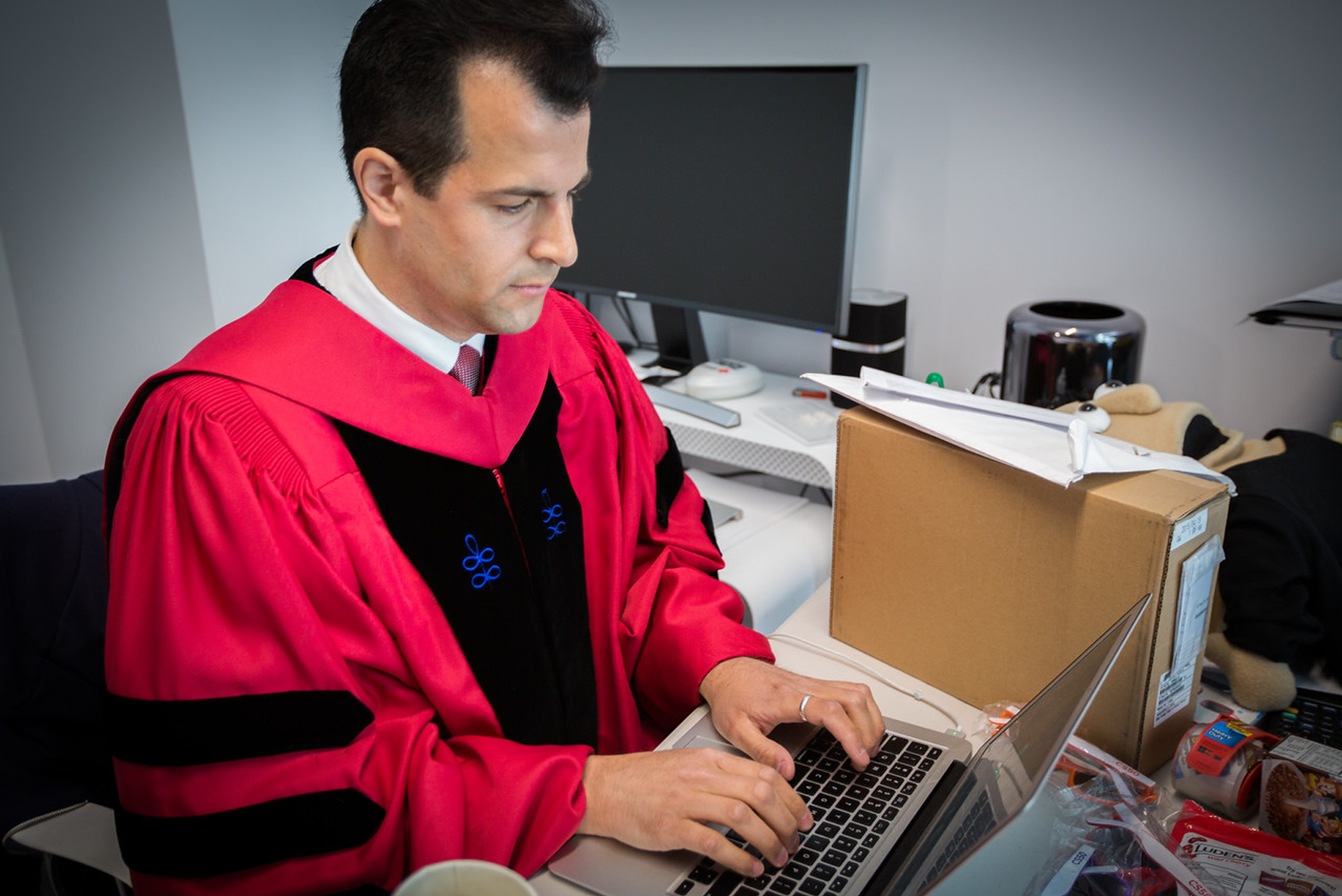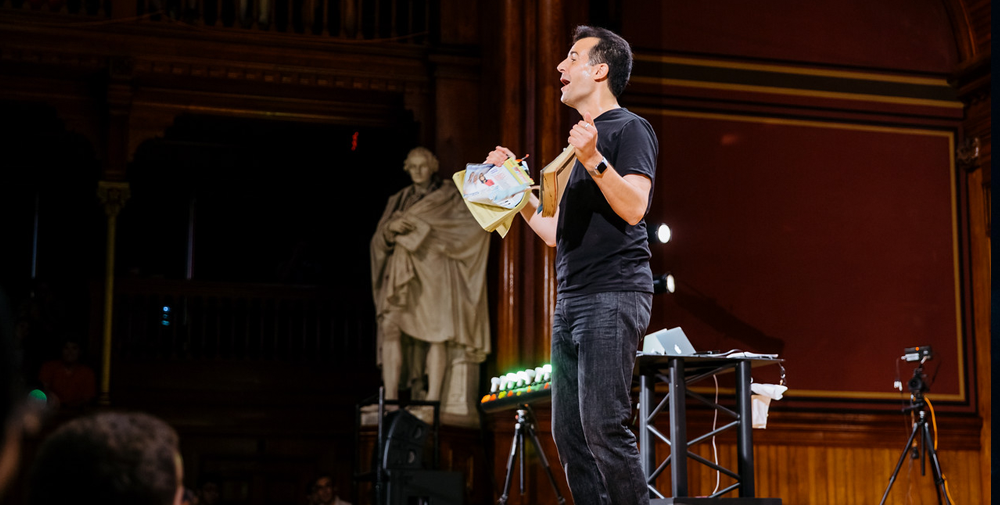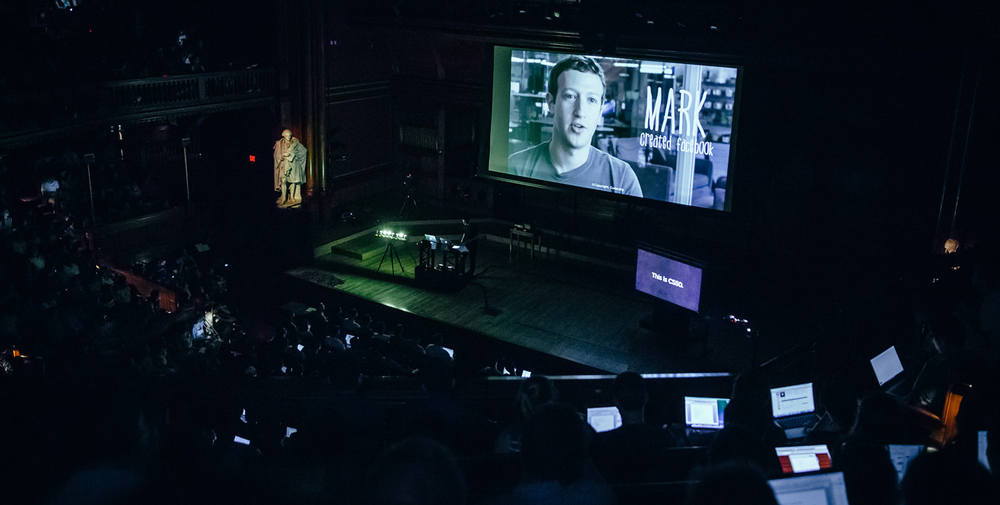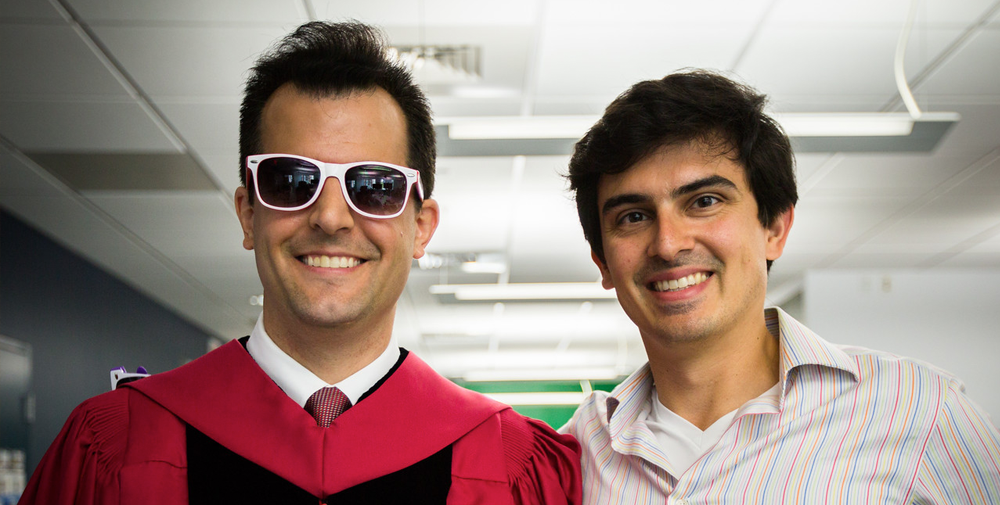Who are you, Professor Malan?

This article will tell you about the Harvard course in Essentials of CS50 Programming from a slightly different angle: through the prism of the person who created this course in its current form, the charismatic David Malan.
Atypical course
Sanders Theater Auditorium, Harvard University Memorial Hall, City of Cambridge, Massachusetts. Here are not only lectures, but concerts, performances, award ceremonies, performances of famous people. These walls are accustomed to the solemn noise of the most varied sense. But even for them, the CS50 course, a course on the basics of programming and computer science, with its spectacularly torn paper directories, DJs, puppets, excerpts from serials, and other elements of popular culture, is not typical, as is Harvard as a whole.
')

Why, there: for any university in the world, it is atypical (theatrical specialties are not taken, there are other tasks). However, the CS50 takes exactly the Sanders Theater, since this is the largest audience at Harvard. In other rooms, anyone wishing to listen to the lectures of Professor Malan risk not fit. In recent years, CS50 is confidently leading in terms of the number of students choosing it (we, naturally, do not consider “virtual” listeners from the Internet).

This was not always the case. At Harvard, the CS50 settled back in the eighties of the last century, but was completely different: qualitative (and not at Harvard!), But quite traditional in style, programming course for beginners. Not too numerous, but inspired many to become "IT people."
Drastic changes came in 2007, when the CS50 was led by David Malan. With his arrival, the course became similar to a fascinating show with an excellently written script, the constant involvement of the audience (students) and various characters, ranging from puppet mappet to the living stars of the IT world, associated with Harvard - Mark Zuckerberg, Bill Gates, Steve Ballmer ...
Someone thinks that the show in these lectures is too much. But! It is important to note that the quality of the course, its academic character and fullness did not suffer. Rather, the opposite: CS50 is constantly evolving, picking up innovations, and does not look like a frozen statue from the past, consisting of technologies that have sunk into oblivion, which feed our students almost everywhere. In the end, this is one of the first university courses, fully accessible on the Internet .
It is known: people are more willing to absorb serious information if it is served with burning eyes and allusions to well-known or catchy things. We are used to the fact that in scientific courses we are fed abstract tasteless rusks, without worrying about our digestion. And the car spun. CS50 began to grow by leaps and bounds.
Of course, the growth of the course cannot be attributed solely to David, with his charisma and remarkable directorial abilities: the sphere itself and interest in it are constantly growing regardless of his efforts. Perhaps with nuclear physics, this number would not have rolled. Yes, and David does not over-pull the whole blanket: he is assisted by numerous assistants from among the young teachers and yesterday's students of the course. Nevertheless, for many, Professor Malan, who not only can talk about the complex, but also inspire, is one of the main reasons for enrolling in the course. So, the sixth lecture of “CS50 Basics of Programming”, which we are translating, was led not by Malan, but by his assistant Rob Bowden. Seeing a stranger, some viewers of the online version of the course were worried: is David really going to leave CS50 and do something else? Perhaps proper research by the professor or more advanced courses? In the end, a person may become bored from year to year to teach the same thing, and even more so - the basics of the basics.
We hasten to assure: David Malan is not going anywhere from the CS50. And in the next section of the article we will try to explain why. More precisely, he will tell us everything.
Atypical professor
David Malan, a professor with the prefix "Gordon McKay" (this name is an additional honorary title of a Harvard professor, established in honor of philanthropist and philanthropist Gordon McKay), is probably the most famous acting teacher at Harvard.

In the column “About me” on his Facebook page - the short phrase “I teach CS50” and no more personal characteristics. Only information about the place of work and study (without surprises: Harvard in both cases, David graduated from college in 1999), about previous projects (IT companies) and place of residence (Cambridge, Massachusetts). As well as links to websites, the names of which mainly include those very familiar to us from the self-description of the four letters: CS50 .
And everything would be fine if you don’t know that CS50 is a course for absolute beginners. His sensible schoolchild who knows elementary mathematics and how to use the keyboard will “pull” with a strong desire.
“I, too, are a matter of pride for a Harvard professor!” Someone will think. We have decided to underestimate primary education in any of the meanings, and the achievements of professors measure the complexity and novelty of their research. And here - the anatomy of computers for complete "noobs" and the basics of programming for them!
If you leave Facebook and search on the Harvard website, we find that David writes something like this about himself:
“My research interests include cyber security, digital forensic tools, botnets, computer science education, distance, joint, and computer training. In graduate school, I worked with Dean Michael D. Smith in the “Group of Programming Languages” (Harvard Students and Teachers Association, studying problems related to the implementation and design of programming languages, editor's note), where I studied programming languages, compilers and security. I was then told that I got a mirror shield, and it would prevent most attacks, and the Like Lykes would not be able to eat it (the last phrase is an allusion to The Legend of Zelda game series, the monster Like Lyrics could eat some types of weapons and armor, but not a mirror Shield. David probably hints at the achievement of "Zen" in the field of security - Ed.
My research was part of a Securitas team project whose main focus is software-level security. In the thesis, I proposed the rapid detection of botnets within the framework of joint networks of peers (here is a link to David's work, in English cs.harvard.edu/malan/publications/thesis.pdf ). One of the practical implications of this work was the Wormboy driver for detecting worms on the server side.
Before joining Securitas, I worked with Professor Matt Welch, in the Code Blue project of the SYRAH group, dedicated to the use of wireless sensor networks for pre-hospital treatment and treatment in the context of emergency care, disaster response and rehabilitation of patients after strokes. Associated with this work was the EccM module for TinyOS, which demonstrates the viability of elliptical cryptography on MICA2. ”
As you can see, with such education, interests and energy, this person could seriously engage in science or create an IT company. Or to teach something advanced, if he really likes to share knowledge with the next generations. But no, for some reason, David leads the CS50 and some more more or less “beginner” courses that do not require profound knowledge from the professor. To another scientist, the “link” to the undergraduate courses, especially the permanent one, may seem depressingly mortal, but not to Malan:
“I listened to CS50 at Harvard when I was in my second year, in the fall semester of 1996, and it became my inspiration for the transition to computer science. He was led by Brian Kernighan himself (“K” in K & R! This abbreviation hides the first book on C written by the authors of the language Brian Kernighan and Dennis Ritchie. - Ed.), He now works at Princeton.
In the summer of next year, I changed my main specialization from political science to computer science. I still remember that Friday evening when I plunged into the first Problem Set (weekly homework on programming). The feeling of recovery that I felt from his decision turned out to be a landmark! Since then, the course has taken a special place in my heart. And if I had to choose one and only one course for teaching, I would not hesitate.
I was very lucky: at the time when I defended my dissertation (Ph. D.), my supervisor Michael D. Smith, who taught CS50, was promoted to the position of dean, and I had the happy opportunity to take up the course. I got to the right place at the right time! ”
Hear? A Harvard professor speaks of the opportunity to teach a beginner course, as a great success and a conscious choice! And it’s not at all boring for him to teach “the same thing year after year”:
“The CS50 is constantly changing, and in the most non-trivial way,” says David. - sometimes these changes relate simply to the timetable, more often to the technologies used, and sometimes geographically! (here David hinted at the official status of CS50 at another university in the Ivy League, Yale, who took the course in 2015 - ed.). These changes keep me in good shape, leaving me motivated and interested. More precisely, even not so: I myself constantly initiate these changes in order to remain motivated and interested!
But besides me, everything changes constantly: every year new students listen to the course, new assistants grow up and all these people bring new ideas for the development of the course. The quantity and quality of practical tasks increases, as well as code demonstrations in lectures. The paradigms we teach also change over time (this, of course, more concerns the part of the web programming course, C changes are affected to a much lesser extent). We also do not linger on the platforms we are used to: in 2015 we connected the CS50 to a modern cloud-based IDE instead of the virtual machine we used before. At some point, the course lectures appeared on the Internet. In 2010, we conducted the Hackathon for the first time, in 2011 we introduced puzzle days, and more recently, in the summer of 2016, the first open coding competition CS50 Coding Contest was held , in which students were asked to solve the maximum number of C tasks.
Currently, we are shooting a course in 4K resolution (we started with a modest picture of SD 4: 3), and in the fall of 2016, it will be presented for the first time to see it in virtual reality glasses. So the monotony from year to year is not about CS50! ”
David's passion for want-not-want, but you get infected. And, perhaps, this is its most important and undeniable dignity, as a lecturer. People who are well aware of the material for beginners - enough. But true popularizers of science or art are always few, but they are able to ignite those who without them could never have known, and could not understand, and could not feel. Remember the tireless popularizers of science, such as Jacob Perelman in the USSR or Isaac Asimov in the USA. The first is known for its mass of popular science books, such as “Entertaining Physics” or “Entertaining Mathematics,” the second, in addition to science fiction books, also very actively wrote popular science on topics from arithmetic and physics to geography and history.
We can also recall Leonard Bernstein. Here he is known primarily as a composer (he wrote musicals and academic music) and conductor, and in the west he is also known as a man who read numerous public lectures on music in the 50-70s, trying to convey its beauty and structure. music to everyone and everywhere. Television recordings of his “Young people concerts”, designed for children, Omnibus telecasts for a wide range of listeners, as well as videos of more serious lectures given by him in Harvard in 1973, have been preserved. In the US, more than one generation of musicians claims that they began to understand music thanks to Bernstein the teacher, many of them “in absentia,” according to the records of his lectures.
Something tells us that the teacher's Malana is waiting (and in part already embodied) a similar fate. And he is extremely pleased with her:
“Before, I couldn’t imagine that I would do what I do today. I started teaching only to improve my public speaking skills. For the first time I spoke to an audience in the third year of my college studies. It was terribly bad. It seemed like I could never be good enough for public speaking. Nevertheless, I worked on improving them, and it seems that I achieved something. I plan to continue using them: I will teach the CS50 for as long as they allow me to do this. Why? Because this is what I truly love. ”
Source: https://habr.com/ru/post/308226/
All Articles